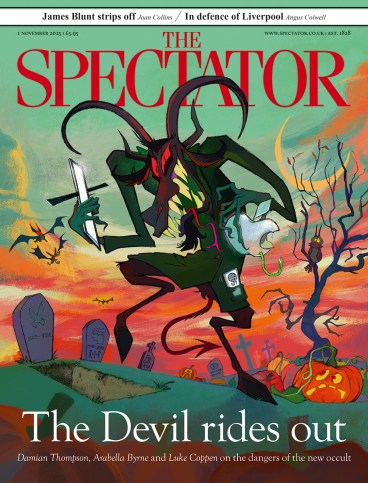
As others, including Nigel Farage, were quick to point out, Sarah Pochin got it wrong. She uttered words which, shorn of their context (as they obviously would be), made her sound racist. But the almost compulsory use of persons of colour to promote products and services is a bit of a wonder of the world. Modernisers often speak of the need for institutions to ‘look like Britain as it is’ (depressing thought), but this seems not to apply on screen. In the style of Ambrose Bierce’s Devil’s Dictionary, I offer a definition of the phrase ‘television ads’, as follows: ‘Short filmic fictions about the blissful and virtuous lives of persons of mixed race or with non-white skin.’
I have written elsewhere about how the RedBird Capital bid to buy the Telegraph Group (for which I work) is going wrong. One of our anxieties as journalists is the rumour that Matthew Garrahan, ex-Financial Times, might become our new editor if the bid succeeds. I do not know him personally. In social media comments (now deleted), the strongly Remainer Mr Garrahan has singled out the Telegraph for obloquy. ‘The Telegraph loves it when migrants are deported (except when it’s the Labour gov doing the deporting and the cost is suddenly very important),’ he exclaims. His artistic taste is striking too: ‘Hooray for Kneecap,’ he tweeted of the Irish band whose name discloses their attitude to the peace process. If he is indeed angling for the job, his method is unusual. With similar perversity, I hereby apply to be editor of the pink-papered pinko FT, with its crawling servility to Davos Man and the European Commission.
Seen from a free-market point of view, the minimum wage was always a bad idea. It reduced the number of jobs for the low-skilled young and loaded extra costs on small businesses. When it was invented in 1999, it seemed to cause little trouble. That was a buoyant time economically, and the policy became uncontroversial politically. You could even argue that a high minimum wage reduced the temptation for the young to live on benefits instead. Now, however – and later, I must admit, than I had expected – it has become a problem. In 1999, it was £3.60. In today’s money, adjusted for inflation, that would be £6.94. Today, the minimum wage stands at £12.21, almost double inflation over the period. When you add that to extra employers’ NI, ‘day one’ employment rights and the rise of AI, you make employing the next generation of chiefly unskilled labour (which nowadays includes arts graduates of bad universities) formidably unattractive. No wonder so many retreat to their lonely bedrooms and investigate the dark web. Cheap labour can be exploitative, but it can also open the door to the world of work to the young and inexperienced – not to mention those with physical handicaps or learning difficulties. How about stopping all rises till further notice, and no longer paying high wages to the Low Pay Commission to decide what the rate should be?
We recently attended the National Harvest Festival at Westminster Abbey, which the present Queen inaugurated and has regularly attended since 2013. It is in aid of Love British Food. She looked just right in what I like to think was Lincoln green. It is a mystery to me why the harvest festival entered the Church of England calendar only as recently as the late 1840s, invented by the great eccentric Hawker of Morwenstow. Many special services for this and that are only tangentially related to religion, but harvest is central to the life of the Old Testament and to the parables of the New. It is perfectly logical, since Rogationtide asks for a good harvest, that the harvest festival should give thanks for the one that arrives about four months later. It was moving to hear words like ‘bread’, ‘seed’, ‘fruits’ given their full Christian resonance in an urban abbey. I was rushing to get out at the end to make a speech but could scarcely complain at being held back by what was in a certain sense Her Majesty’s most pious moment – her careful inspection of loaves, turnips, leeks and cabbages outside the West Door.
I would warmly endorse last week’s favourable review of Judy Montagu’s The Greyhound Diary. Normally I find travel journals one of the least interesting literary forms, but the lively young Englishwoman bussing round the United States at the pinnacle of its civilisation (1949) captures a moment. Judy’s high social class but low means of transport bring out the dizzying contrasts. Her account of a drunken Mary Pickford rehearsing how she would personally persuade Stalin to bring about world peace is a tour de force. One warning. The book appears very big, and readers thinking of giving it for Christmas may wonder why a light travelogue need be so long. The answer is that it is not much more than half as long as it looks, because each left-hand is mainly blank, carrying what would normally be footnotes, mainly tiny biographies of all sorts met along the way. It offers three hours of pleasure, not six hours of slog.
People keep sending interesting things since I mentioned place names (see Notes, 18 October). Prue Leith alerts me to Stephen Vincent Benét’s poem ‘American Names’: ‘I have fallen in love with American names,/ The sharp names that never get fat,/ The snakeskin titles of mining claims,/ The plumed war-bonnet of Medicine Hat,/ Tucson and Deadwood and Lost Mule Flat.’ The poet contrasts American names favourably against European ones. The last stanza brings it all together, and the last line is famous: ‘I shall not rest in Montparnasse./ I shall not lie easy at Winchelsea./ You may bury my body in Sussex grass./ You may bury my tongue at Champmedy./ I shall not be there. I shall rise and pass./ Bury my heart at Wounded Knee.’ (By the way, no one seems to know where Champmedy is.)








Comments